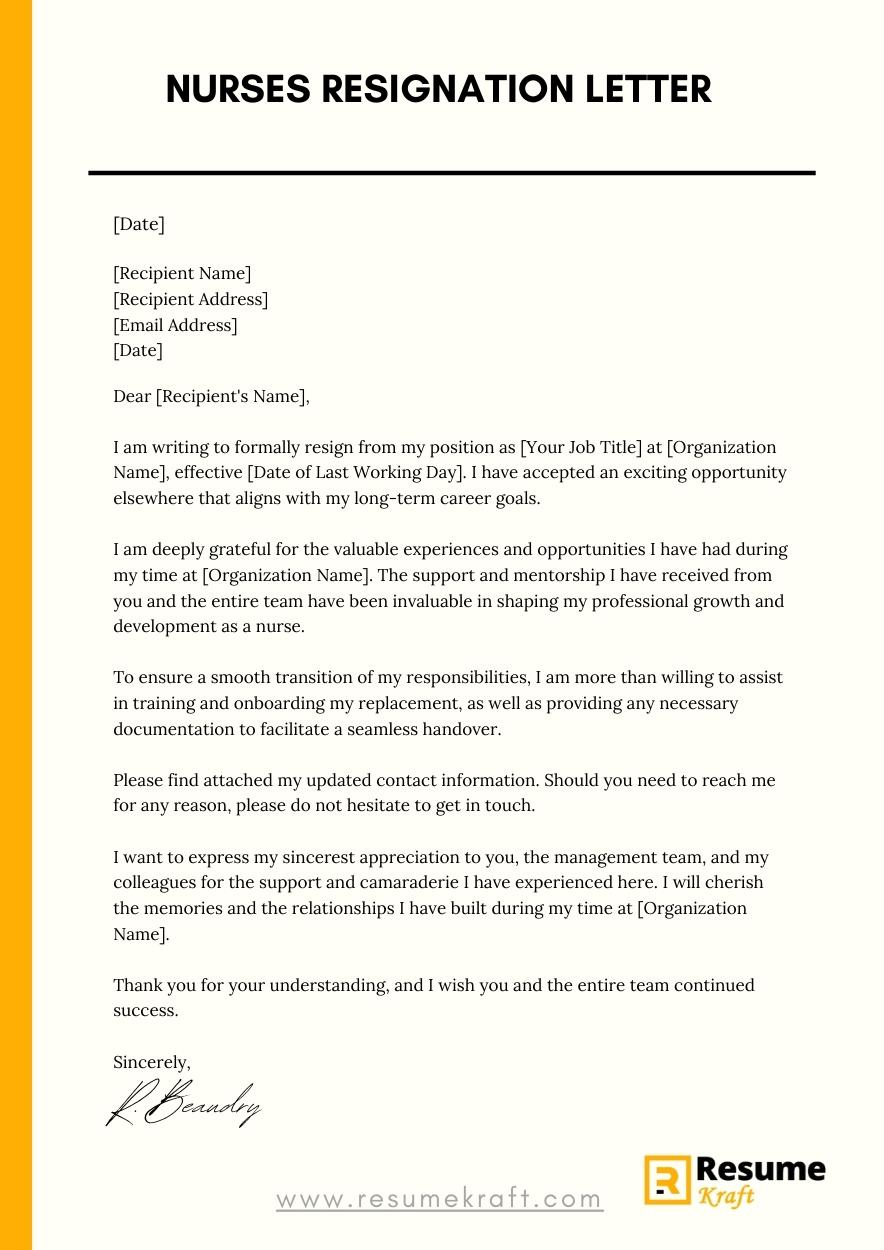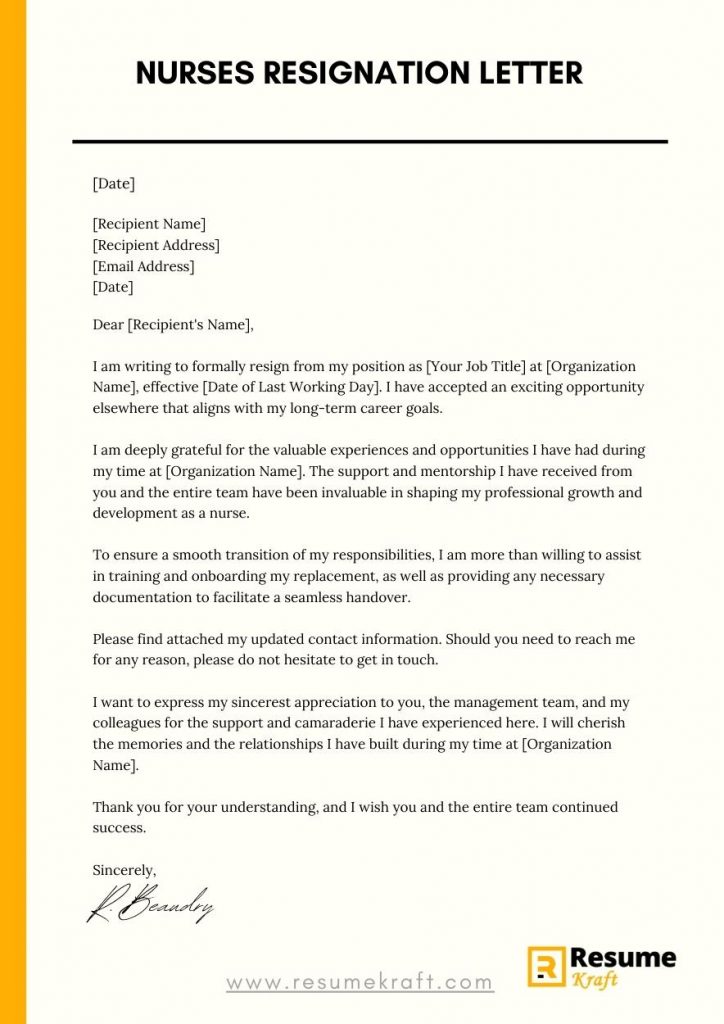
A resignation letter is an essential part of the resignation process for nurses looking to leave their current position. It serves as a formal notification to your employer of your intent to resign and leaves a lasting impression. Crafting a well-written resignation letter is crucial in maintaining professional relationships and securing future references. In this article, we will guide you through the process of writing a professional and effective resignation letter, providing expert tips and various samples to help you navigate this important step.
Are you a nurse planning to resign? Learn how to write a professional and effective resignation letter with our step-by-step guide and samples below.
- What To Include in a Nurses Resignation Letter
- What Not to Include in Your Nurses Resignation Letter
- How To Format a Nurses Resignation Letter
- Nurses Resignation Letter Samples
- Key Takeaways
- Frequently Asked Questions
- 1. Should I provide an explanation for my resignation in the letter?
- 2. Is it mandatory to offer assistance in the transition period?
- 3. Can I resign without providing a notice period?
- 4. Should I mention any issues or grievances in my resignation letter?
- 5. Is it necessary to write a resignation letter if I am leaving on good terms?
- Conclusion:
What To Include in a Nurses Resignation Letter
When writing a resignation letter as a nurse, it is important to include specific details such as your intended last day of work, appreciation for the opportunity to work for the organization, and a positive tone. Here are the key elements to include in your resignation letter:
- Date: Begin your resignation letter by including the current date.
- Recipient Information: Address your letter to your immediate supervisor or the appropriate person in a position of authority.
- Greeting: Start with a polite and professional salutation, such as “Dear [Supervisor’s Name].”
- Statement of Resignation: Clearly state your intention to resign and provide the effective date of your last day of work.
- Appreciation: Express gratitude for the opportunities and experiences gained during your time with the organization. Highlight specific accomplishments or positive aspects of your employment.
- Transitional Assistance: Offer your assistance in facilitating a smooth transition of your responsibilities to a new nurse or team member.
- Contact Information: Include your updated contact information so that your employer can reach you if needed.
- Closing: Sign off with a professional closing such as “Sincerely” or “Best Regards,” followed by your full name and signature.
What Not to Include in Your Nurses Resignation Letter
While it is important to express your gratitude and professionalism in your resignation letter, there are certain things you should avoid including:
- Negative Remarks: Refrain from including any negative comments about your colleagues, supervisors, or the organization itself. Stay focused on the positive aspects of your employment.
- Complaints or Grievances: Your resignation letter is not the place to air grievances or complaints. Handle any concerns through appropriate channels before submitting your letter.
- Personal Reasons: Unless it directly impacts your job, avoid including personal reasons for resigning. Keep the letter professional and focused on the workplace.
- Excessive Detail: Keep your resignation letter concise and to the point. Avoid unnecessary details or explanations.
- Emotional Language: While it’s natural to have emotions during the resignation process, ensure that your resignation letter maintains a professional and neutral tone.
How To Format a Nurses Resignation Letter
Formatting your resignation letter properly helps convey professionalism and ensures it is easy to read. Here are some formatting tips to consider:
- Font and Size: Use a professional font such as Times New Roman, Arial, or Calibri in size 12.
- Margins: Set your margins to 1 inch on all sides for a clean and balanced layout.
- Alignment: Align your letter to the left and use single-spacing within paragraphs.
- Paragraph Structure: Use short paragraphs to improve readability. Each paragraph should focus on a specific point.
- Use of Bold: Emphasize important details such as your intended last day of work or contact information by using bold formatting.
- Proofread: Double-check your resignation letter for any spelling or grammatical errors before submitting it.
Nurses Resignation Letter Samples
To help you visualize how a resignation letter should be written, here are two sample letters: one for a printed resignation letter and another for an email resignation letter.

Printed Resignation Letter Sample:
[Your Name]
[Your Address]
[City, State, Zip Code]
[Email Address]
[Phone Number]
[Date]
[Supervisor’s Name]
[Title]
[Organization Name]
[Address]
[City, State, Zip Code]
Dear [Supervisor’s Name],
I am writing to formally resign from my position as [Your Job Title] at [Organization Name], effective [Date of Last Working Day]. I have accepted an exciting opportunity elsewhere that aligns with my long-term career goals.
I am deeply grateful for the valuable experiences and opportunities I have had during my time at [Organization Name]. The support and mentorship I have received from you and the entire team have been invaluable in shaping my professional growth and development as a nurse.
To ensure a smooth transition of my responsibilities, I am more than willing to assist in training and onboarding my replacement, as well as providing any necessary documentation to facilitate a seamless handover.
Please find attached my updated contact information. Should you need to reach me for any reason, please do not hesitate to get in touch.
I want to express my sincerest appreciation to you, the management team, and my colleagues for the support and camaraderie I have experienced here. I will cherish the memories and the relationships I have built during my time at [Organization Name].
Thank you for your understanding, and I wish you and the entire team continued success.
Sincerely,
[Your Full Name]
[Your Signature]
Email Resignation Letter Example:
Subject: Resignation – [Your Name]
Dear [Supervisor’s Name],
I hope this email finds you well. I am writing to formally resign from my position as [Your Job Title] at [Organization Name], effective [Date of Last Working Day]. After careful consideration, I have decided to pursue a new opportunity that aligns with my long-term career goals.
I would like to express my gratitude for the support, guidance, and opportunities I have received during my time at [Organization Name]. It has been a privilege to work alongside such talented colleagues and make a positive impact on the lives of our patients.
I am committed to ensuring a smooth transition of my responsibilities, and I am available to assist in any way possible to facilitate this process. Please find attached my updated contact information for any future reference or communication.
Once again, I want to express my sincerest appreciation for the experiences and growth opportunities I have had at [Organization Name]. My time here has been invaluable, and I am grateful for all that I have learned.
Thank you for your understanding, and I wish you and the entire team continued success. Please let me know if there is anything further I can do to assist during this transition.
Best regards,
[Your Full Name]
Key Takeaways
- Writing a well-crafted resignation letter is essential when leaving a nursing position.
- Include key elements such as the date, recipient information, statement of resignation, appreciation, transitional assistance, contact information, and a professional closing.
- Avoid including negative remarks, complaints, excessive detail, personal reasons, or emotional language in your resignation letter.
- Format your letter using a professional font, appropriate margins, left alignment, short paragraphs, and proofread for errors.
- Sample resignation letter samples are provided for both printed and email formats.
Frequently Asked Questions
1. Should I provide an explanation for my resignation in the letter?
It is not necessary to provide detailed explanations for your resignation in the letter. Keep it professional and focused on your appreciation and intentions.
2. Is it mandatory to offer assistance in the transition period?
While offering assistance is a professional gesture, it is not mandatory. It depends on the circumstances and your relationship with your employer.
3. Can I resign without providing a notice period?
Ideally, it is best to provide a notice period as per the terms of your employment contract. However, if circumstances require an immediate resignation, communicate your reasons to your employer as soon as possible.
4. Should I mention any issues or grievances in my resignation letter?
No, your resignation letter is not the appropriate platform to address any issues or grievances. Discuss such matters separately with the relevant people within the organization if necessary.
5. Is it necessary to write a resignation letter if I am leaving on good terms?
While it is not always mandatory, writing a professional resignation letter is considered a best practice. It showcases your professionalism and leaves a positive impression for future references.
Conclusion:
Crafting a well-written resignation letter as a nurse is crucial when transitioning from one job to another. Follow the guidelines shared in this article, including the dos and don’ts, to ensure your resignation letter reflects your professionalism, expresses gratitude, and maintains positive relationships. Use the provided samples as a reference to create your personalized resignation letter and leave your current position on a positive note.

